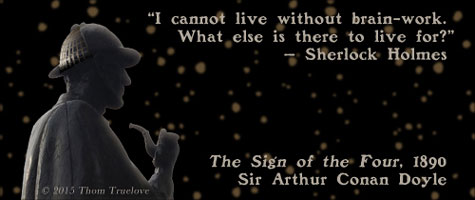
From the moment advertising of Mr. Holmes began, I was certain that I would see the film. My love for Sherlock Holmes began at what I consider quite a young age. The Great Detective was included on a list of personal heroes I’d made while in elementary school. What’s more, Sir Ian McKellen, who is enjoying very well-deserved regular work (and who I am told I’m growing to resemble as I grow older), was portraying Mr. Holmes.
I suspected it might be difficult to find a theater showing Mr. Holmes, considering an audience more lately familiar with Benedict Cumberbatch or Robert Downey, Jr. in the inverness mantle, but every effort to find myself in the audience was going to be made.
Yet, there was a faint memory of another movie involving one of my childhood heroes, Robin Hood, that caused a twinge of trepidation. A few years after its 1976 release in theaters, Robin and Marian was shown on television. I thought it would be wonderful to see one last adventure. However, as Lady Marian, Audrey Hepburn chose an entirely logical tactic near the end that resulted in tragedy in the film—and an emotional catastrophe for me. I believe I cannot watch it a second time. I couldn't bare the same fate to befall the beloved Sherlock Holmes.
Alas, even with these factors in mind, a friend and I were able to find a theater showing Mr. Holmes very near to its July 24, 2015 release date. While the opening credits were still unfolding, the density of important imagery promised a more than satisfactory tale. In all honesty, the subject matter, casting, and cinematography meant—to me—that there would have to be an intentional turn by the filmmakers to provoke me to hate this film. Bias admitted.
 The film is an adaptation of A Slight Trick of the Mind by Mitch Cullin (2005), and it presents a long-retired gentleman facing a failing memory and the end of his life. Within the story, Sherlock Holmes has long been at odds with the fictionalization by Dr. John Watson of their past cases and adventures. In his twilight years, he’d like to set the record straight but cannot recall the details.
The film is an adaptation of A Slight Trick of the Mind by Mitch Cullin (2005), and it presents a long-retired gentleman facing a failing memory and the end of his life. Within the story, Sherlock Holmes has long been at odds with the fictionalization by Dr. John Watson of their past cases and adventures. In his twilight years, he’d like to set the record straight but cannot recall the details.
A lifetime spent concerned with facts and clues has not prepared Sherlock for dealing with his later years when neither is easily brought into focus. He can, in fact, no longer recall precisely why he retired. This becomes the final mystery—his last case. Ian McKellen masterfully portrays the character at both fifteen years older and younger (in flashbacks) than the actor’s present age.
In the opinion of this author, Mr. Holmes is a loving homage and contribution to the most celebrated franchise to come out of Sir Arthur Conan Doyle’s oeuvre, and so it is unfortunate that a lawsuit involving copyright and trademark infringement was filed before the film’s release. The works published between 1923 and 1927 are not yet in public domain, and some of the aspects of Mr. Holmes—as it was felt at Conan Doyle Estate Ltd.—tread on the ground of these works still under copyright.
The action did not prevent the release of the film—and fortunately so; a settlement was announced while the movie was still in (some) theaters. The details of the settlement were, of course, not disclosed.
Remakes and reboots often miss the essence of characters they hope to present. There are too many examples of violations of canon or simply not paying enough attention to the details. Perhaps, since Mr. Holmes serves more as an epilogue and not a reimagining, these problems are avoided. While the character attempts to debunk Watson’s fabulism and his own past, the movie follows suit with some of our notions in a playful yet respectful manner.
The moments of fan service are subtle. For example, the detective has lived long enough to see movies based on Dr. Watson’s dramatizations. As Mr. Holmes invites us to view the detective as having lived a real life, and considering that he’s been played in real life by more than 75 different actors and appeared in over 250 filmed adaptations, Holmes watching Holmes is not difficult to accept. The notion is explored to clever effect, in fact. A film within a film enhances the full circle intent of Mr. Holmes by showing us Nicholas Rowe as “matinee Sherlock Holmes.” Thirty years earlier, Mr. Rowe was the titular Young Sherlock Holmes.
Over the course of the film, we see a character famous for an obsession with truth, logic, and brain-work pivot to another, much more foreign path of investigation. We gain a perspective on a now very human Sherlock than most of the public domain novels and older films have presented.

Although he does recover some of his past and solve the mystery (don’t worry, no spoilers here), in the process, he finds something on which he never had a firm grasp—humanity. More than discovering his own, he finally understands and has an appreciation for the full compass of quality.
Laura Linney’s part in the film—as a housekeeper and de facto caretaker for Sherlock—provides the mechanism for this discovery. Without a criminal foil like Professor Moriarty, she is a very different counter-point, almost an opposite, for Sir Arthur Conan Doyle’s most famous creation.
There is a moment of jeopardy, and while watching, I thought to myself:
“Okay. This is the moment I’m going to cry. This is the Robin and Marian moment I was worried about.”
Thankfully, what I’d feared might happen wasn’t actually the case. This poignant tale neither passes the torch nor extinguishes it, but allows it to become an eternal flame in the dignity of having done its job.
Mr. Holmes, and the aforementioned Young Sherlock Holmes, may not stand out as instant classics, but both are worthy and complimentary bookends for any Sherlock Holmes collection.
Thom Truelove is the co-founder of Psych Wing (a group developing short films set primarily in the sci fi genre) and a collaborating partner on future sci fi/fantasy novels with gothic Victorian fantasy author Leanna Renee Hieber (Tor Books).
As an essayist, his work has been picked up by such anthologies as the forthcoming “The Book of Starry Wisdom: Apocrypha of Lovecraft's Cthulhu” (edited and produced by Simon Berman). You are invited to visit Thom's blog, “Surfing the Zeitgeist” at thomtruelove.com.
